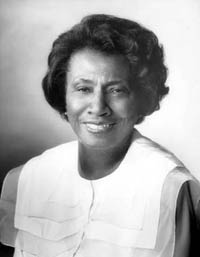Known primarily for her choral works, Undine Smith Moore (1904-1989) was a prolific composer and educator who was recognized during her lifetime. She worked extensively with a wide range of students, from grade school through graduate school, and was the recipient of numerous honors and awards including being named music laureate of Virginia in 1977.

Though her compositions demonstrate her ability to write in small and large forms, including chamber works, Moore’s most acclaimed works are choral. Her oratorio based on the life of Dr. Martin Luther King, Jr., titled Scenes from the Life of a Martyr, was premiered at Carnegie Hall and nominated for a Pulitzer Prize.
Undine Smith Moore gave the keynote address to the First National Congress on Women in Music held March 27, 1981 at New York University. Regarding the role of women composers Moore said (in part):
I have been asked to comment on my beliefs related to the role of women composers in the twentieth century. Let me say at the outset, I believe that the role of women in music will be enormously expanded. From what I have heard this morning, it is already expanded. I believe that acceptance of a change in the role of women and the removal of limitations in our society have profound implications for the woman as artist, the woman as musician. Since all liberation is connected, the Black woman musician will have with other women the results of this societal change. Men, too, will profit. Whenever any group achieves any kind of liberation, those who have participated in their former condition, I almost said “condition of servitude,” also gain freedom or release.
Who can argue with that?
Here is an example of Moore’s work for solo voice and piano:
